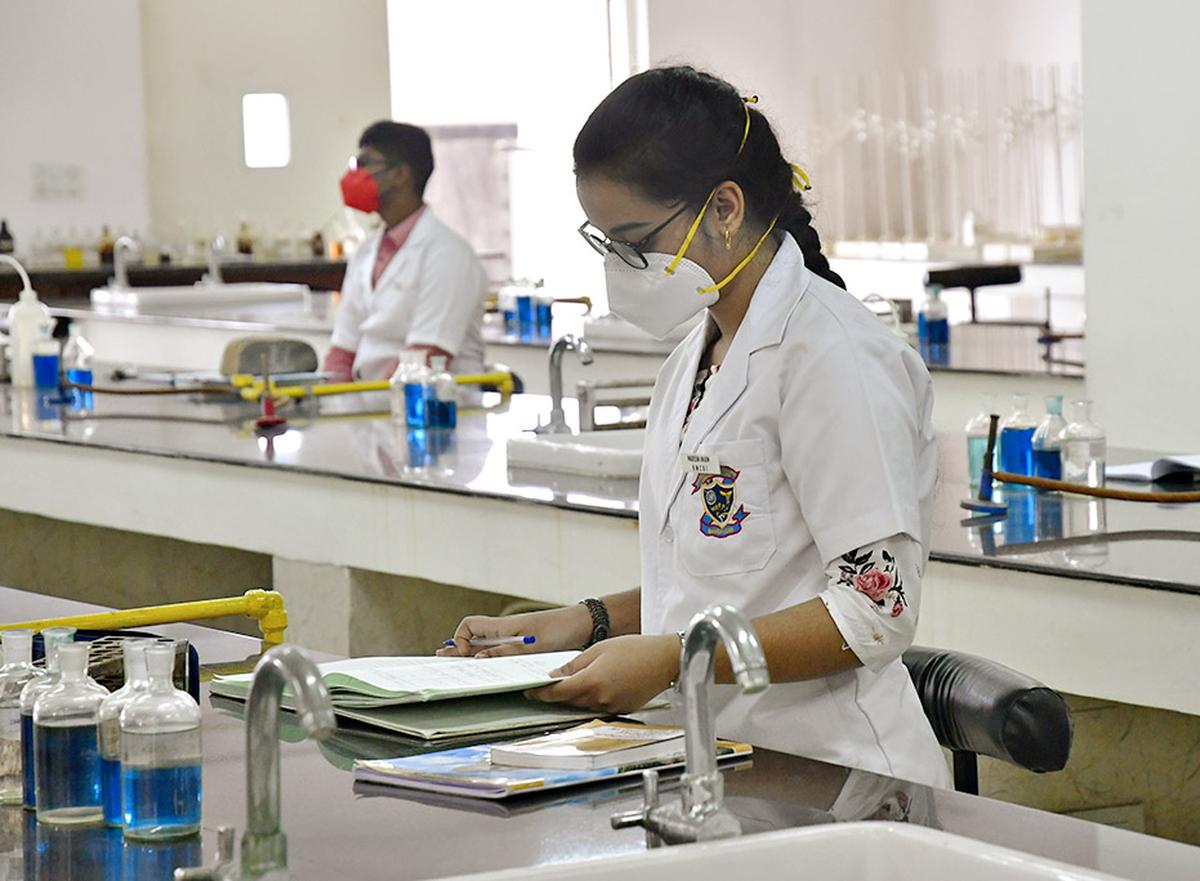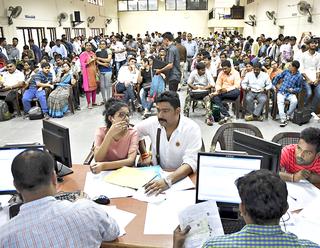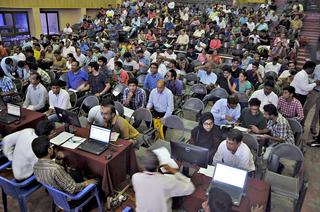In a major boost to medical education, Karnataka has secured the lion’s share of additional medical seats sanctioned by the National Medical Commission (NMC) this year. The increase is being seen as a significant development for the state, which has long been a hub for medical aspirants from across India. Officials said that Karnataka accounted for a substantial proportion of the total seats added nationwide, reflecting both its institutional capacity and the growing demand for medical education in the region.
The NMC’s decision was based on an evaluation of infrastructure, faculty availability, and hospital facilities across states. Karnataka, with its network of government and private medical colleges, stood out for its readiness to accommodate more students. Experts believe this move will not only expand opportunities for local students but also attract aspirants from other states, thereby strengthening Karnataka’s position as a leader in medical education. The expansion is expected to help bridge the doctor-patient ratio gap and improve healthcare delivery in both urban and rural areas.
Authorities have stated that the additional seats will benefit multiple medical colleges, with a balanced distribution between government and private institutions. This ensures that students from diverse economic backgrounds can access opportunities. Furthermore, the increase comes at a time when the demand for doctors and specialists is at an all-time high due to recent health crises. Stakeholders believe that this expansion will contribute significantly to India’s healthcare system by producing more trained professionals each year.
Boost to Students and Healthcare
Medical aspirants in Karnataka will have a higher chance of securing seats without leaving the state for alternatives.
Healthcare institutions will gain more young professionals, strengthening the overall public health infrastructure.
Institutional Readiness
Colleges with strong faculty bases and infrastructure were prioritized in the allocation of additional seats.
Authorities emphasized quality assurance to ensure that enhanced intake does not compromise medical training standards.
Strengthening Karnataka’s Role in Healthcare Education
Karnataka’s success in securing a large share of medical seat enhancement underscores its pivotal role in shaping India’s medical future. With more opportunities for students, better resource utilization, and stronger healthcare support, the state is poised to lead in both education and service delivery.
Officials noted that this growth would have long-term benefits for rural healthcare, as many graduates are expected to serve in underserved regions. Colleges are also expected to upgrade facilities further to meet the NMC’s stringent requirements. Experts argue that Karnataka’s example could inspire other states to strengthen their medical infrastructure for future expansions.
The move has been welcomed by student groups, parent associations, and healthcare professionals, who see it as a timely step toward addressing both education and public health challenges. While challenges such as faculty shortages and infrastructure scaling remain, Karnataka’s established base offers it an advantage in adapting quickly.

In the long run, the state’s prominence in medical education will further consolidate its reputation as a national hub for healthcare excellence, benefiting students, professionals, and citizens alike.
In a major boost to medical education, Karnataka has secured the lion’s share of additional medical seats sanctioned by the National Medical Commission (NMC) this year. The increase is being seen as a significant development for the state, which has long been a hub for medical aspirants from across India. Officials said that Karnataka accounted for a substantial proportion of the total seats added nationwide, reflecting both its institutional capacity and the growing demand for medical education in the region.
The NMC’s decision was based on an evaluation of infrastructure, faculty availability, and hospital facilities across states. Karnataka, with its network of government and private medical colleges, stood out for its readiness to accommodate more students. Experts believe this move will not only expand opportunities for local students but also attract aspirants from other states, thereby strengthening Karnataka’s position as a leader in medical education. The expansion is expected to help bridge the doctor-patient ratio gap and improve healthcare delivery in both urban and rural areas.
Authorities have stated that the additional seats will benefit multiple medical colleges, with a balanced distribution between government and private institutions. This ensures that students from diverse economic backgrounds can access opportunities. Furthermore, the increase comes at a time when the demand for doctors and specialists is at an all-time high due to recent health crises. Stakeholders believe that this expansion will contribute significantly to India’s healthcare system by producing more trained professionals each year.
Boost to Students and Healthcare
Medical aspirants in Karnataka will have a higher chance of securing seats without leaving the state for alternatives.
Healthcare institutions will gain more young professionals, strengthening the overall public health infrastructure.
Institutional Readiness
Colleges with strong faculty bases and infrastructure were prioritized in the allocation of additional seats.
Authorities emphasized quality assurance to ensure that enhanced intake does not compromise medical training standards.
Strengthening Karnataka’s Role in Healthcare Education
Karnataka’s success in securing a large share of medical seat enhancement underscores its pivotal role in shaping India’s medical future. With more opportunities for students, better resource utilization, and stronger healthcare support, the state is poised to lead in both education and service delivery.

Officials noted that this growth would have long-term benefits for rural healthcare, as many graduates are expected to serve in underserved regions. Colleges are also expected to upgrade facilities further to meet the NMC’s stringent requirements. Experts argue that Karnataka’s example could inspire other states to strengthen their medical infrastructure for future expansions.
The move has been welcomed by student groups, parent associations, and healthcare professionals, who see it as a timely step toward addressing both education and public health challenges. While challenges such as faculty shortages and infrastructure scaling remain, Karnataka’s established base offers it an advantage in adapting quickly.
In the long run, the state’s prominence in medical education will further consolidate its reputation as a national hub for healthcare excellence, benefiting students, professionals, and citizens alike.
Student Reactions to Increased Opportunities
Students across Karnataka have expressed relief that more medical seats will now be available. Many aspirants, who otherwise considered moving to neighboring states for opportunities, believe this decision reduces uncertainty and financial burdens. Parent associations have also welcomed the move, emphasizing that local access to medical education will lower costs related to accommodation and travel. Coaching institutes in Bengaluru and Mysuru have reported a surge in queries, as the enhanced seats raise students’ chances of admission. This, they argue, will reduce stress levels among aspirants who previously faced extreme competition.
Role of Government Colleges
A significant portion of the new medical seats has been allocated to government colleges, which offer affordable education. This decision has been widely lauded, as it ensures that students from economically weaker backgrounds will not be left behind. Government institutions, already known for their quality education and clinical exposure, are now expected to play a bigger role in shaping the next generation of doctors. Authorities have confirmed that additional infrastructure grants will be provided to these colleges to handle the increased intake without compromising standards.
Private Institutions Expanding Facilities
Private medical colleges, too, are set to benefit from this allocation. Many of these institutions have already invested in upgrading facilities, laboratories, and teaching hospitals to meet NMC norms. The enhanced seat count gives them an opportunity to attract students nationally and internationally. However, stakeholders caution that affordability will remain a challenge, as private institutions often charge significantly higher fees. Some experts suggest that the government should explore scholarship schemes or subsidies to ensure equitable access across all economic groups.
Healthcare System to Benefit
Beyond education, the healthcare system in Karnataka is expected to gain significantly from the move. With more students entering medical programs, hospitals linked with colleges will receive additional workforce support in the form of interns and residents. This is particularly beneficial for rural and district hospitals, where staffing has been a persistent challenge. Doctors’ associations believe that within the next five to ten years, the impact will be visible in improved patient care, reduced waiting times, and enhanced access to specialist treatments in underserved regions.
Bridging the Doctor-Patient Ratio Gap
India’s doctor-patient ratio continues to remain below the World Health Organization’s recommended standards. Karnataka’s move to expand medical seats contributes directly to addressing this imbalance. Experts note that if the increased intake is maintained consistently over the next decade, the state could see a major leap in its doctor availability. This would not only help meet local needs but also position Karnataka as a key supplier of skilled doctors to other parts of India and abroad, furthering its global reputation in healthcare training.

Infrastructure and Faculty Challenges
Despite the optimism, the expansion is not without challenges. Concerns have been raised about whether institutions have enough trained faculty to accommodate the additional intake. Medical educators stress that simply increasing seats without ensuring quality faculty could dilute the standard of medical education. Infrastructure expansion is another key area, as more students require additional hostels, classrooms, and hospital beds for clinical rotations. The NMC has assured that it will closely monitor compliance, and institutions failing to meet the requirements could risk losing recognition.
Experts Call for Balanced Approach
Experts argue that the expansion must be accompanied by reforms in curriculum and training. Merely adding seats, they say, will not guarantee improved healthcare outcomes unless students are trained in emerging areas such as telemedicine, digital health, and advanced diagnostics. The Indian Medical Association has called on policymakers to strengthen internship programs and promote placements in rural areas. By doing so, the additional workforce can be effectively utilized to fill gaps in primary healthcare, which remains underfunded in many districts of Karnataka.
Follow: Karnataka Government
Also read: Home | Channel 6 Network – Latest News, Breaking Updates: Politics, Business, Tech & More

